Last round of the February Tournament, and I lost.
I actually feel a bit disappointed with myself, as I was hoping for as good a game as last week, but that did not happen.
Partly this must be due to 'non-chess' circumstances, but also my opponent was 180 points above me, so probably to be expected !
I believe I have to re-think how I approach chess, whether I am looking for an improvement in rating, or more for a satisfaction of playing an enjoyable game : or both !
But there's the rub...
I would guess that without putting in effort to improve my approach to combinations, tactics, openings : chess in fact, I may not develop skills, and hence my appreciation of the game and playing it. A bit of a vicious circle in fact.
So time to re-appraise and see where the effort can best be placed...
On to the game...
Black...against 1.e4 and I decide to play the Philidor again.
So far when playing this, I have generally experienced an early exchange on d4, and have been focused on that more than other lines.
However, as I discovered, and you can see, there is a difference between playing an early e5 against d4 with an exchange (ie 1.e4 e5 2.Nf3 d6 3.d4 ed ), and delaying it (1.e4 e5 2.Nf3 d6 3.d4 Nf6 4.Nf3 Nbd7 5.Bc4 ed ). The latter is not so advantageous to Black and probably surrenders too much of the centre, too soon.
So that is the first decision point for me after 5. Bc4

After 5.de, 6. Nxef Ne5 seems good, as it attacks the bishop, but all that happens is that it retreats to b3, and still exerts it's influence toward f7. I think this is what I keep fearing, the Ng4 and bishop combination against f7, but on reflection, the threat is minimal.
The better move is Be7 directly ( rather than when I played it ). Ng4 is met by 0-0 and although bxf7+ is playable, Black has the better of it, as eventually, the White Knight is trapped after Nxa8. A point to remember next time.
We reach 8.f4. Seems very aggressive, and I spent considerable time on the reply.
Surprisingly ( to me ) this has been reached in 15 games in my database ( not all from the Philidor move-order), the highest rated pairing being a 2409/2235, so I don't feel so dumb about it ! ( the White side being a John Donaldson who seems an active chess writer these days. His opponent Fillip Frenkel, seems not to have fared so well in life according to this link . I guess the key phrase is "which unfortunately remains unpublished due to his insanity", although the game shown is very neat... ).
In OTB play, Ng6 was chosen most, with Bg4 a close second, but I think that the more prosaic retreat of Ned7 gives Black a more even game and "equal chances" ( see reference game ). As previously mentioned my 8.Nc6 is probably part of me being 'active' and trying to do something, rather than just playing the sensible defensive move : it doesn't always work.
This is partly what Jonathon Rowson talks about with his "doing and being" states. Sometimes you need to just "be", and let your opponent do the work....
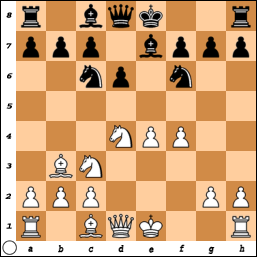 [Black moves 8...Nc6]
[Black moves 8...Nc6]
In retrospect, not the best as after Nxc6 Black is left with doubled c-pawns. Not terminal, as they provide a strong-point later in the game, but they also restrict my movement.
Next moves follow naturally until 11.f5
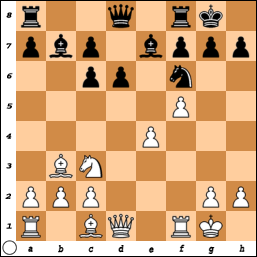 [Black plays 11...Bb7]
[Black plays 11...Bb7]
My intention here was to aim the bishop down the a8-h1 diagonal, also threatening the e4 pawn with Nf6. I planned the d5 advance and subsequent exchanges, but didn't see how powerful Qg4 really was in conjunction with the f- and e-pawns...
11...Nd7 yet again seems the better and key move in this position. It seems strange that certain moves recur during the game. The skill is seeing it and playing at the optimal moment. 11...Ba6 is an alternative ( which also kept prompting me later ), but I think this just reminds White to move it and doesn't achieve much.
Back to the game, and I carry through my plan : that's what you are supposed to do. Better a plan than no plan at all ?
However, yet again, I think now that rather than Bc5+ and Ne4, Nd7 was a simpler move and places the onus on White to do something. I don't have the advantage, so I shouldn't be attacking. So much easier in retrospect !
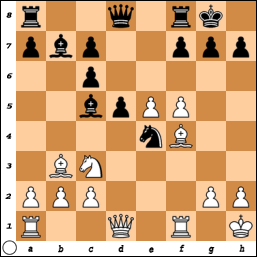 [Black moves 14..Ne4] is a mistake.
[Black moves 14..Ne4] is a mistake.
Although I calculate through to Qg4, I don't see the strength of it. I also spend far too long working out Kg8 and am seriously behind in time now, another general problem that I need to resolve.
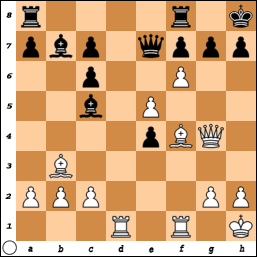 [White plays 18.f6 ]
[White plays 18.f6 ]
...was a killer move, and I should have given up then, but I recognised that his moves 19.Rd7 and 20.Rxe7 gave me a small chance,so I hung on for a bit longer. 20.ef was a much stronger move, which would have left me stranded.
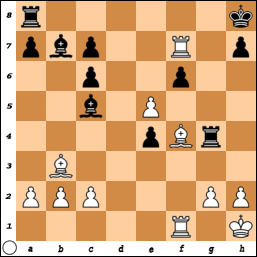 [White plays 21.Rxf7]
[White plays 21.Rxf7]
The queen exchange left me losing a pawn, but with significant threats removed. However, with 21.Rxf7 ( rather than 21.Rxc7 ) all is effectively over given that I have 5 minutes to his 30 !
Ba6 is a last chance, but c4 is obvious, and running out of time, I do not advance the e-pawn as I should have. 22..Rg7 is a bad move that loses a pawn, and with a slip of Rc8 instead of b8 ( I was hoping for a vain threat of Bxb2+ ) it is all over.
I've included two reference games. The Donaldson-Frenkel match mentioned, and also one that matches the position after after 9.f4 with a response of Nd7. Technically starting as an Italian Game , but that shows transpositional opportunities !
Not a bad game, but I didn't enjoy it as much as the encounter last week.
Final tournament result: 1 win out of four games, and 21st out of 41 players. Not a disaster, so next month, another attempt !!
23 February, 2010
ICC Monthly Tournament (February 2010) Round 4
Posted by Signalman at 23:37
Subscribe to:
Post Comments (Atom)

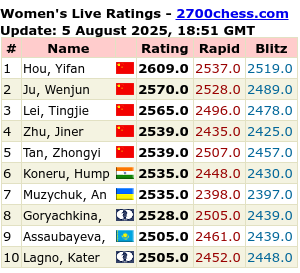
1 comments:
Wow, I won a prize!! One month extension for my amazing record of one bye, two losses and one forfeited game!
Post a Comment